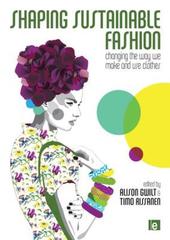
|
Shaping Sustainable Fashion: Changing the Way We Make and Use Clothes
Paperback
Main Details
| Title |
Shaping Sustainable Fashion: Changing the Way We Make and Use Clothes
|
| Authors and Contributors |
Edited by Alison Gwilt
|
|
Edited by Timo Rissanen
|
| Physical Properties |
| Format:Paperback | | Pages:192 | | Dimensions(mm): Height 240,Width 170 |
|
| Category/Genre | Fashion and textiles - design
Sustainability |
|---|
| ISBN/Barcode |
9781849712422
|
| Classifications | Dewey:746.92 |
|---|
| Audience | | General | | Tertiary Education (US: College) | |
|---|
| Illustrations |
Colour photographs, colour maps, colour diagrams
|
|
Publishing Details |
| Publisher |
Taylor & Francis Ltd
|
| Imprint |
Earthscan Ltd
|
| Publication Date |
21 January 2011 |
| Publication Country |
United Kingdom
|
Description
The production, use and eventual disposal of most clothing is environmentally damaging, and many fashion and textile designers are becoming keen to employ more sustainable strategies in their work. This book provides a practical guide to the ways in which designers are creating fashion with less waste and greater durability. Based on the results of extensive research into lifecycle approaches to sustainable fashion, the book is divided into four sections: source: explores the motivations for the selection of materials for fashion garments and suggests that garments can be made from materials that also assist in the management of textile waste make: discusses the differing approaches to the design and manufacture of sustainable fashion garments that can also provide the opportunity for waste control and minimization use: explores schemes that encourage the consumer to engage in slow fashion consumption last: examines alternative solutions to the predictable fate of most garments -- landfill. Illustrated throughout with case studies of best practice from international designers and fashion labels and written in a practical, accessible style, this is a must-have guide for fashion and textile designers and students in their areas.
Author Biography
Alison Gwilt is the Course Director for Fashion & Textile Design at the University of Technology Sydney, Australia and is a fashion design academic and researcher who has been exploring sustainable solutions and strategies for fashion and textile design through her practice-based research activities and PhD studies. She has more than 18 years experience in academia managing and lecturing in fashion and textiles design in the UK, New Zealand and Australia. Timo Rissanen is the Assistant Professor of Fashion Design and Sustainability at Parsons The New School for Design in New York. His fashion design practice is informed by inquisitive patternmaking and broad sustainability concerns.
Reviews'Alison Gwilt and Timo Rissanen [are] zero-waste pioneers.' New York Times 'An authoritative new book ... [that] provides an eloquent description of the scale of the problem, both in terms of the environmental impact of the fashion industry and the myriad ways in which the current industry is stacked against sustainable practice.' DAMn Magazine 'This book is an invaluable reference for anyone serious about designing fashion and textiles for sustainability. From designers empowered through knowledge and motivated by applying traditional skills in new ways, to the everyday practical wisdoms of the wearers' 'craft of use', Shaping Sustainable Fashion outlines how sustainability can help shape cultural attitudes and suggest new behaviours in everyone. This book helps us envision not only sustainable products, but also a sustainable culture and society.' Lynda Grose, Fashion Designer, Assistant professor, Fashion and Sustainability at California College of the Arts 'Designers will play a critical role in reducing the fashion industry's negative impacts on the environment. Shaping Sustainable Fashion illustrates four meaningful and memorable areas to create sustainable solutions across a garment's lifecycle-Source, Make, Use, and Last.' Marsha Dickson, Professor of Fashion and Apparel Studies, University of Delaware 'Through exploratory essays and case studies, this book brings a realistic and insightful perspective on many urgent concerns about the relationships of fashion, textiles and sustainability. Rissanen and Gwilt combine their professional and research findings astutely to present original and practical solutions to some of the major challenges facing fashion practices - present and future.' Hazel Clark, PhD, Dean, School of Art and Design History and Theory, Parsons the New School for Design, New York
|